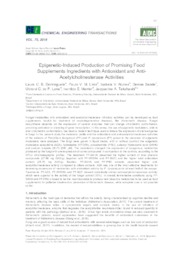Epigenetic-induced production of promising food supplements ingredients with antioxidant and anti-acetylcholinesterase activities.
Epigenetic-induced production of promising food supplements ingredients with antioxidant and anti-acetylcholinesterase activities.
Author(s): DOMINGUETEA, L. C. B.; LIMA, P. V. M.; NUNES, I. V.; SANDE, D.; LANA, U. G. de P.; MARRIEL, I. E.; TAKAHASHI, J. A.
Summary: Fungal metabolites with antioxidant and acetylcholinesterase inhibitory activities can be developed as food supplements helpful for treatment of neurodegenerative diseases, like Alzheimer's disease. Fungal biosynthesis depends on the expression of several enzymes that can change chromatin?s conformation, provoking activation or silencing of gene transcription. In this sense, the use of epigenetic modulators, able to alter chromatin?s conformation, has been a modern technique used to induce the expression of silenced genes in fungi. In the present study the metabolic profile and the antioxidant and anti-acetylcholinesterase activities of the extracts of Penicillium flavigenum (PF) and P. tanzanicum (PT) grown in the presence of epigenetic modulators were analyzed. The fungi were grown in liquid media, with or without (control) the epigenetic modulators azacytidine (AZA), hydralazine (HYDRA), procainamide (PRO), suberoyl hydroxamic acid (SAHA) and sodium butyrate (BUT) (500 uM). The modulators changed the expression of exogenous metabolites produced by the fungi with overexpression of some compounds in comparison to the controls, according to the HPLC chromatographic profiles. The treatment PF-SAHA presented the higher content of total phenolic compounds (27.86 mg GAE/g) (together with PF-HYDRA and PF-BUT) and the higher total antioxidant content (25.70 mg AAE/g). Besides, PF-SAHA and PF-PRO extracts presented higher antiacetylcholinesterase activity compared to others extracts. AZA was one of the most effective treatments for increasing expression of metabolites with antioxidant activity by P. tanzanicum in at least half of the assays. Treatments PT-AZA, PT-HYDRA and PT-BUT showed statistically similar anti-acetylcholinesterase activity, which were superior to the activity of the fungal control (15%). In overall, fermentative conditions using PFSAHA and PF-PRO showed to be the most favorable to produce new bioactive metabolites to be used as food supplements for palliative treatment or prevention of Alzheimer?s disease, while complete cure is not possible so far.
Publication year: 2019
Types of publication: Journal article
Unit: Embrapa Maize & Sorghum
Keywords: Doença neurodegenerativa, Enzima, Fungo
Observation
Some of Embrapa's publications are published as ePub files. To read them, use or download one of the following free software options to your computer or mobile device. Android: Google Play Books; IOS: iBooks; Windows and Linux: Calibre.
Access other publications
Access the Agricultural Research Database (BDPA) to consult Embrapa's full library collection and records.
Visit Embrapa Bookstore to purchase books and other publications sold by Embrapa.

